
PUMPA - SMART LEARNING
எங்கள் ஆசிரியர்களுடன் 1-ஆன்-1 ஆலோசனை நேரத்தைப் பெறுங்கள். டாப்பர் ஆவதற்கு நாங்கள் பயிற்சி அளிப்போம்
Book Free DemoFirdaus Kanga writes about his experiences of visiting England in his travelogue. He specifically visits a place called Cambridge. Cambridge is a small city about \(80\)km north of London. It is specifically known for its university buildings and literary circles. The University of Cambridge is the second oldest University in English speaking countries. It had existed for a long time now that it serves as a part of historical reforms. It was established by a group of research scholars from Oxford University after a small dispute. The University has in its list of alumni, the world's most famous academicians, philosophers and scientists, from Charles Darwin to Stephen Hawking. This is probably the reason why Kanga says that Cambridge was a metaphor for England to him. A metaphor is a comparison and equates two things that have similarities. Kanga considers Cambridge as a benchmark with which he views the whole England. Cambridge serves as the real England for him. But he says that when he left England, he had only one thing to take away, which was his memories with Stephen Hawking.
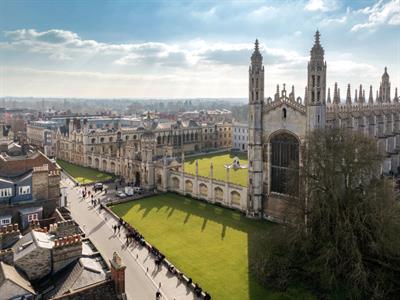
University of Cambridge
During his travel, Kanga happened to visit Cambridge, where he was taken on a walking tour across the campus. He was shown the architecture, gardens, resources in the University by the guide. As a passing comment, the guide mentions the name of one of the renowned alumni and scientist and astrophysicist 'Stephen Hawking'. But rather than mentioning the numerous achievements and his theories, he is only sympathised for being disabled. The guide refers to Hawking as a mere poor man who is disabled, only after which is the fact that he is a worthy successor to Sir Issac Newton is mentioned. Hawking also holds the chair of Newton, the renowned physicist who formulated the theory of universal gravity. This serves as the major theme of the lesson as to how famous people are only recognised initially with their disability and not their contribution to the society.
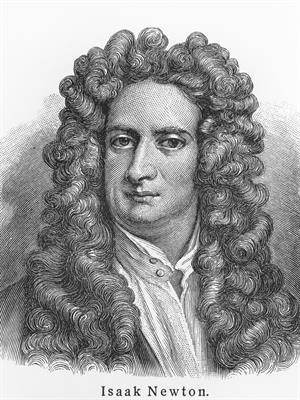
Issac Newton
Firdaus Kanga walks around the campus of Cambridge when he was reminded by the guide that Stephen Hawking lived in the same town. He had almost forgotten that Hawking lived there. He recalls that he was the most brilliant astrophysicist and was also the author of the book 'A Brief History of Time', which was one of the best sellers ever. The book explains concepts like Big Bang theory and black holes in simple terms in a way that a person who is not well versed in physics may understand. He talks about space and time and the forces in the Universe that govern it. The book changed the outlook on science in a great deal. Apart from that, there was a connection between Kanga and Hawking that they were both disabled and yet did not crave for sympathy.

The big bang
After the walking tour, Kanga's mind was occupied with Hawking's image and he made up his mind to make the best use of his availability in Cambridge. He rushed to the phone booth to see if he can reach Hawking's residence. Since he was on the wheelchair, he had to tug at the phone cord to reach him outside the booth, as he was unable to take himself inside. He calls Hawking's residence and gets his assistant on line. Kanga explains that he had come from India in a wheelchair to explore Britain and write about his travel experiences. He humorously notes that his statement that he had come from Indian on a wheelchair might have given the impression to the assistant that he had literally pushed the wheelchair from India to Britain. This also emphasises that disabled people might unintentionally mention their disability and later wonder if people would understand that they do not do so for sympathy. Kanga requests to meet Professor Hawking, even if it is at least for ten minutes. The ten minutes with the genius is similar to an hour of listening to any academic lecture for Kanga. But to his luck, the assistant confirms the meet for half an hour, from three-thirty to four in the evening.

Phone booth
Firdaus Kanga makes the phone call in a haste as soon as he heard from the guide about Stephen Hawking. He does not wait to plan or think much about making the call, as it is an action made out of curiosity and reverence. Hawking is someone who is confined to a wheelchair and yet has made it big in the world. He is an inspiration to Kanga, who is also confined to a wheelchair and striving towards achieving huge things. Kanga emphasises how physically strong do not tend to understand the difficulties faced by disabled people. After making the phone call, Kanga feels weak in the knees. When we want to achieve something, we get fuelled up and make the preparations in haste, as our mind is only focussed on the goal. But when it is finally time to meet or face the end result, we tend to get nervous. For example, we might want to get admitted into a college, put in efforts to prepare and even take up the exam. But on the day of the result, we tend to get weak in the knees. Similarly, Kanga was not thinking when he made the phone call as he was so keen to meet Hawking. But once the appointment gets scheduled, he faces the reality that he is going to meet his idol and is scared that he might mess it up.

Nervous man in a wheelchair
Kanga also talks about toxic positivity by people around him who are physically strong. People tend to throw phrases and quotes about courage, being strong, being positive etc. Although it is important for people to motivate each other, it is also necessary to empathise with other human beings. Kanga is fed up of people making superficial comments on being courageous and brave, without considering the fact that he his experiences and struggles as a disabled person is different. He recalls funnily that he does not have a courage account in the bank from which he can withdraw it any time that he wants to. People need to understand that each person's experiences, lifestyle choices, ambitions are different and that human beings are allowed to feel emotions like fear, anger, love etc. Some people get things easily and some others do not have the same privileges and tend to feel certain emotions in a different way. But when we converse with a person who is going through the same thing as we do, it is easier to relate to various situations. It is also inspiring when one sees them achieve great heights, as it gives one the confidence that it is possible. It makes us reach out further to attempt and strive towards greatness.
After fixing the appointment, Kanga meets Stephen Hawking at his residence the next afternoon. Kanga does not reveal the welcoming or the settling down, rather straight away narrates Hawking's views on his life. Hawking reveals that he does not consider himself to be brave, rather that he did not have any other choice in life. He speaks with the help of his speech generating machine, and his voice sounds computerised. Kanga, who had to put up with people telling him to be brave, had considered Hawking to be brave owing to all his achievements in the field of astrophysics and cosmology. But Hawking recounts that when life puts one into a situation where one is left with very little choice, one has to be brave. There is a difference between being brave naturally and being brave because one's situation forces you to.
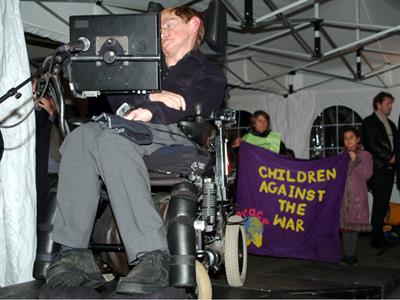
Hawking with his speech generating machine
Kanga is slightly taken aback as he is curious to know as to how one can choose to live life creatively in spite of knowing that his body is slowly getting paralysed and non-functioning. But due to reverence, he does not ask it out loud to Hawking. He also limits his words as he feels extremely guilty for troubling a disabled person like him. He knew how difficult it was to respond when one's body does not cooperate. On top of it, Hawking had to search for the right button to make a sentence as he could not speak. When his whole body was paralysed, he still had movement in the fingers. Every time he wanted to communicate, he had to search for the right words and tap the switch in the speech generating machine. His fingers are already pale due to constant typing. At times, his eyes would shut in frustration. It is difficult to have a lot of thoughts flooding in and not being able to communicate with the same flow. Kanga compares his sentences and phrases to being as stiff and frozen as corpses.
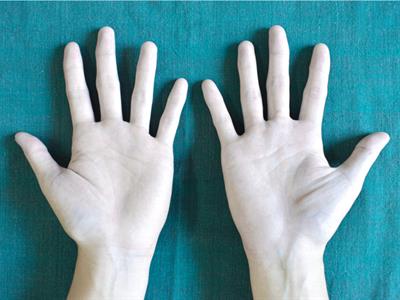
Pale fingers
Kanga asks Hawking what his views were on people who think that disabled people are always unhappy. People, in general, tend to judge and offer their sympathy to people who are disabled, rather than understanding that they want to be treated equally and like a normal human beings. Being a disabled person himself, Kanga knew that he was not chronically unhappy due to his disability. He wanted to know if Hawking found this notion funny. Hawking takes around three minutes to respond as a full-on conversation can exhaust him. He says that he does find it amusing when people offer their sympathy or help only to show that they have superiority over him.
Firdaus Kanga is guilty of having disturbed Hawking, as he has to use his machine every time he wants to convey something. Being a man who is paralysed in the whole body, except for a few working limbs, Hawking was visibly tired and irritated as it hinders the flow of communication. Kanga's guilt makes him ask the question if Hawking finds it annoying when people like Kanga barge into his privacy and ask questions, thereby disturbing his busy schedule. Hawking immediately responds with a yes, without taking time to type it out. It flashes on the screen with the computerised voice. But it only takes minutes for Kanga to realise that Hawking was sarcastic, as he gives a wide grin. His smile was a one-way smile as his mouth was paralysed and his face shifted to one side when he tried to smile. It made him look as if he was the most beautiful man in the world, as he looked more innocent and childlike. The author is not being sentimental or silly, rather he is giving a genuine compliment.
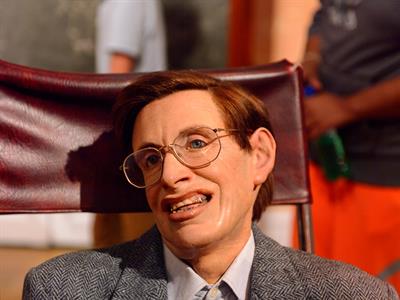
Stephen Hawking smiling
Kanga explains that at first glance, Hawking looks different from any other human being. So far, he had only seen Hawking in pictures and newspapers. But in reality too, he looks like a still photograph from a magazine. He looks as if his picture has been turned into three-dimensional. Although his face looks still, his smile could convey a variety of emotions. At one glance, he may look rigid, but when observed keenly, one can see Hawking's head twisted sideways into a slump, as his disease does not allow him to turn his face upright. He also had his lean body tucked into a pale blue shirt, spotting a simple look. His legs were wasted, meaning that they could not carry him anywhere as it was completely paralysed. But when his entire body seems lifeless, his eyes are full of life, as it conveys all emotions. They communicate a message that is huge and urgent, but no one seems to interpret it in a proper way. Amidst all these, the author is shaken by the wonder called Stephen Hawking who is sitting right opposite him, with his eyes conveying a million secrets.
Kanga uses a beautiful metaphor to show how much depth Hawking held within his paralysed body. He affirms as to how one's body is only like a cloak and does not play much significance in life. He compares Hawking to a lantern whose walls are worn out thin, but has an illuminating light within it. One does not pay attention to the thin walls as long as the light emanating from within is shining. Likewise, Hawking's mind and soul makes one ignore the fact that his body does not function properly. The light inside the lamp is the incandescence of Hawking, and the thin walls are compared to his body. People tend to give more prominence to how one looks or one's body is. But one can have all the looks in the world and the best body and still feel empty inside. It does not matter how one looks or how fit one's body is, if they do not have the right approach to life, right intelligence, right people to love, or a peaceful and happy mind. Kanga, who was so far not a believer of eternal souls, understands the true meaning of life and that everything else is a mere accessory.

A Lantern
Kanga had asked Hawking as to what was the best thing about being disabled. Being disabled himself, he asks this question only to know if there is a different approach to the disability. But he gets the same answer from Hawking, which he knew to be true. Hawking says that there is no best thing about being disabled. People also tend to romanticise hardships and disabilities. But in reality, one has to understand that it is a painful way of existence. One can understand this without necessarily sympathising with it. But Kanga's view differs from Hawking as he feels that there is one good thing about being disabled. One gets to see how much kindness there is in the world. They get to see how people can selflessly help each other and be there for one another. People who lack or miss something easily recognise the little things that are good around them, whereas the rest do not notice it in their busy world.
Hawking agrees with Kanga with a yes. But the computer generated voice does not reveal the tone of the speaker or the emotions behind it, and Kanga is not able to identify the enthusiasm behind the yes.
Kanga adores Hawking with each passing minute, and with every twist and turn of his body, he checks his watch to see how long he has in order to spend quality time with the legend. He knows that he only has half an hour and does not want to waste it. He wants to make every minute count. When one is in the presence of something that makes one happy, all troubles are forgotten. Kanga relishes all the possibilities of his body and feels a huge relief. When we think we are facing the utmost difficulties and see someone who has more troubles than us making the best use of life, we tend to be grateful for all the little blessings in our life. In the presence of Hawking, Kanga experiences the greatest happiness, that at that moment, he does not mind the fact that he cannot walk or even stand.
Kanga tells Hawking that he had been beyond an inspiration in his life, as there are several factors that connect them. He also emphasises the fact that it is not a cliche ́, as very often we hear people say that they are inspired by someone just for the sake of saying it. When Kanga asks if the thought that Hawking had inspired many people helps him in any way, he replies with a quick no. Kanga immediately realises that it was a foolish thing to ask. When one lives with a disability, knowing that with each passing day, one is getting one step closer to more pain or death, it is not a pleasurable thing to know that normal people are getting inspired by the mere fact that one exists. He again compares this existence to a claustrophobic room where the walls keep shrinking as days pass. It is easy for healthy people to smile at disabled people's struggle and take inspiration from it, as they do not understand the pain behind it.
When Kanga asks if Hawking wants to give any advice for disabled people for making their life better, he replies that they should concentrate more on what they are passionate about and work on it. He also says that hosting Olympics for disabled people does not change anything and is a waste of time. This is because when disabled people are pressured into achieving something they are not good at, it might not give proper end results. Instead, one needs to focus on his passion and work on his skills, irrespective of his disability. The author completely understands this point as he remembers how he had tried to play a Spanish guitar which was more than his size. He was not really passionate about it. But in order to make himself feel worthy, he decided to take it up as a cover to his insecurity. He only managed to unstring the guitar overnight as it was something that he was really good at.

Spanish Guitar
When we talk to people who have a lot of intellect, we tend not to keep track of time. We look forward to gain insights from the person we look up to as an inspiration. Kanga notices that the half an hour that was scheduled was already up. He reluctantly decides to end the meeting. At the same time, he is also grateful for the time he spent talking to Hawking. He notes that he has annoyed Hawking enough, as this is a reference to the sarcastic note made earlier in the lesson. When he is about to end the meeting with a formal thank you and talk about how enlightening the session had been, he is cut short by Hawking.
Hawking very surprisingly does not want to end the meeting. At the same time, he does not want it to be interactive either. He just asks for the company and to have tea with him. This probably indicates that Hawking liked the conversation with Kanga. He might be feeling the same way as Kanga did, that he could connect with a disabled person as they both are experiencing the same kind of situation. Hawking offers to show Kanga the garden. Generally, all interviews are just random conversations between people and are very formal. But when one establishes a deep connection with a person, he tends to reveal his personal side and things that he enjoys the most. Hawking takes Kanga to the garden and shows him around every nook and corner. The garden was as big as a park. Hawking moves around in his motorised wheelchair, followed by Kanga, who makes sure not to dodge or come in his way. It was a very silent scenario, and they dwelled in it. It was not an awkward pause as Hawking enjoyed every moment, basking in the sun making his letters on screen also pause for a while.

Gazing at the sun in the park
What was scheduled for half an hour went on for another extra hour. Kanga did not know what to do or how to react. He knew that he could not kiss or cry as a part of the farewell. But he just touches Hawking's shoulders which is enough to express all his emotions and love and wheels out of the garden. It was a summer evening and when Kanga looked back, he knew that Hawking was inwardly waving although he was paralysed. Watching Hawking was an embodiment of himself for Kanga, as this was what he strived to achieve in a few years from now. He says that this one beautiful chapter is over as for now and there is a lot more for him to strive for.